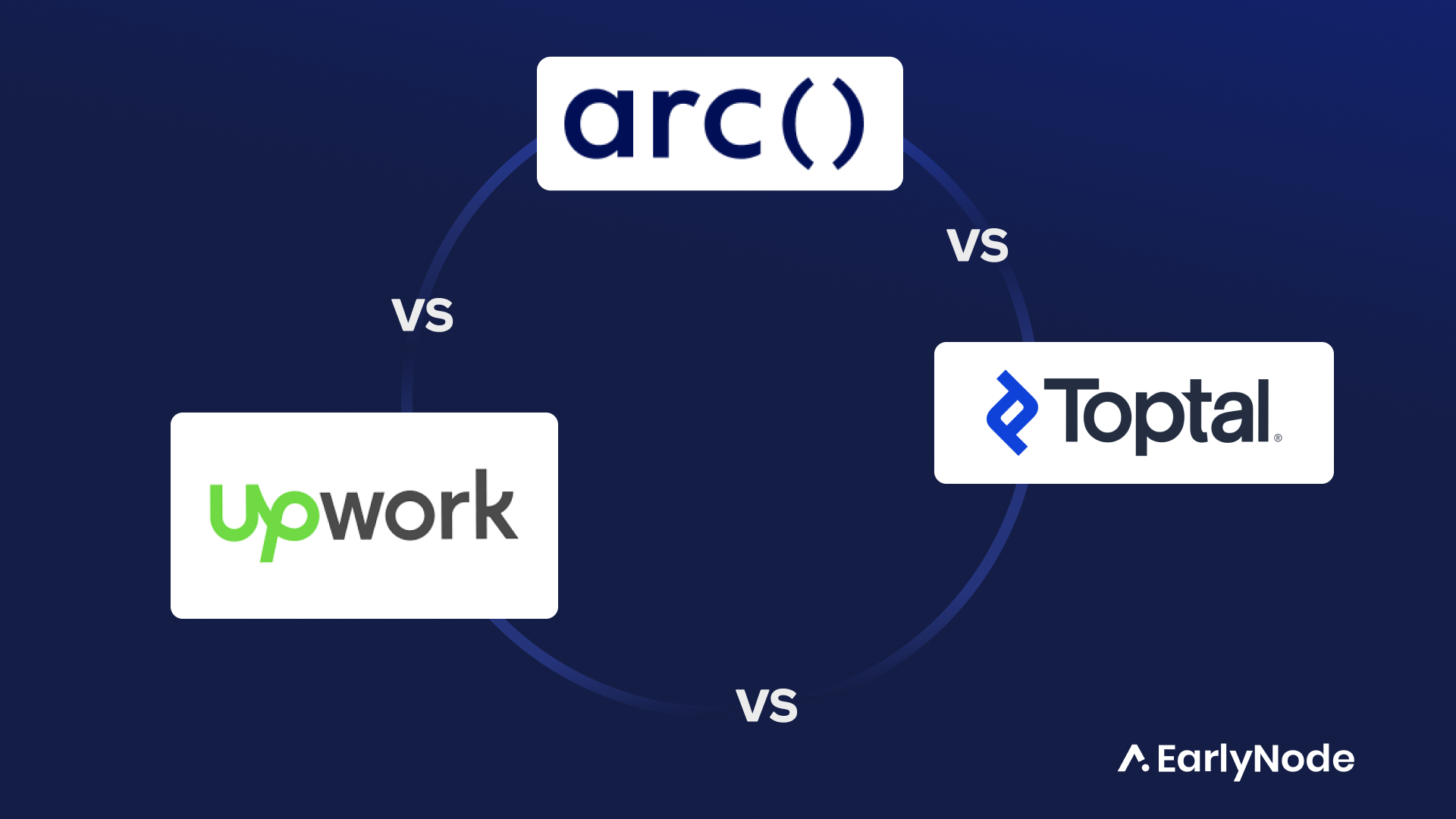Best Tips for Early Stage Recruiting for B2B SaaS Startups

Getting the right people on board is crucial for any company to grow and do well, especially for startups. However, startups face unique challenges, like not being as well-known.
Another issue is many startups don’t really take the time to hire the right people. Because of the desire to grow fast, there’s a rush to hire without a proper hiring strategy in place. Years later, those mistakes start to backfire and cost them.
In this article, we’ll show you the best tips to help you recruit the right talent and common hiring mistakes to avoid to help give your early-stage startup the best chance of having a solid, stable team for growth.
Importance of Effective Recruiting in A Startup’s Success
Not having a well-thought-out plan for hiring can lead to problems down the line. To put it in perspective, almost half of newly hired staff usually leave in less than two years. That’s years of investment down the drain, and replacing them slows growth. Startups can’t afford this; they need the money to improve their products and the speed to grow quickly.
That’s why having a solid recruitment plan for hiring is essential. It can save money and help make sure employees know what they’re signing up for, making them more likely to stick around.
Recruiting isn’t just about filling positions; it’s also a way to show your startup’s work culture. This is important as it can impact a startup’s performance in the market. So, startups should seize the opportunity to focus on recruiting and work on building an attractive work culture.
Common Mistakes Early Stage Startups Make In Recruiting
#1 Hiring the first best candidate
In the early stages of a startup, the people you hire are crucial. Rushing this process and hiring the first good candidate might mean you’re not getting the best person for the role. With a limited pool of 3-5 candidates, your viewpoint is narrow.
This might mean you don’t have a full understanding of the range of skills and experiences available out there. Making decisions without seeing the broader picture can lead to missed opportunities.
#2 Hiring too many too fast
Many startups are keen to make a big splash right at the beginning, so they start bringing on a lot of people, sometimes even before they’re truly ready. Often, this is done to show potential investors that they mean business, but sometimes, it’s more about ego than actual gains.
But, how startups hire should be careful and in line with their long-term plans. Some of the most successful startups have been led by lean and mean teams, meaning they’re small but efficient and quickly adapt to changes.
#3 Hiding details during interviews
Interviews are a chance for both companies and candidates to learn about each other. Sometimes, startups might not be completely honest and try to hide their challenges, presenting a better image than reality. But startups are usually works-in-progress, so being upfront about this is essential.
Painting a perfect picture can attract the wrong candidates who expect everything to be smooth and set up. Instead, being honest about the challenges can attract people who are excited about solving problems and are okay with imperfection.
It’s important to discuss both the good and the bad during interviews. Employees will find out the truth eventually, and if they feel they were misled, they might not stay. Besides, those looking for a perfect workplace might not be suited for the startup environment.
#4 Ignoring the red flags
In a market with limited qualified talent, it’s tempting for startups to overlook warning signs and hire candidates just based on their skills and impressive CVs, especially when they meet key specs.
However, ignoring red flags can lead to hiring the wrong person, which can harm a startup, especially in its early stages of growth. Trust your guts when hiring, ensure you’re not biased, carefully weigh your decisions, and avoid hiring the candidate if he doesn’t seem like a fit.
7 Best Recruitment Tips for Early-Stage Startups
#1 Fill critical roles first
This is like building the foundation of a house; you need to get it right before you build the rest. These roles are super important because they help set your startup’s direction and ensure everything runs smoothly. If you hire in these positions first, you have experts in place to help make the big decisions and guide the work of others. Some of these roles are:
For a tech startup, the first five critical roles to consider hiring typically include:
1. Developer /Founding Engineer: This person will oversee the technical vision and development of your product, ensuring it is built correctly, is scalable, and meets the needs of your customers. They will lead your development team and make critical decisions on technology and architecture.
2. Sales/ Business Development Manager: This role is critical for generating revenue. They will work to acquire new customers, develop partnerships, and identify new business opportunities to drive growth.
3. Marketing Manager: The Marketing Manager will define and manage your brand and how you reach customers. They will work on creating demand for your product through various marketing channels and ensuring that your value proposition is clear and compelling.
4. Customer Success/Support Representative: This person is key to keeping your customers happy. They will handle customer inquiries, troubleshoot issues, and gather feedback to help improve your product. Happy customers are more likely to become long-term users and product advocates.
5. Product Manager: A Product Manager will help you define what to build and why. They will work closely with customers, the development team, and other stakeholders to make sure the product meets user needs and is developed efficiently and effectively.
#2 Identify the right talent
Hiring the right talent is critical for an early-stage SaaS startup. Here are 4 factors to consider when evaluating candidates:
Hard skills
Look for individuals with the relevant technical skills for your product and good problem-solving ability. Reviewing their previous work can provide insights into their skills and the quality of their work.
Shortlist the most impressive candidates for interviews and offer coding challenges or projects to gain firsthand experience of their skills.
Soft skills
The ideal person should have strong communication skills and collaborate easily with team members. A candidate who isn’t a team player can’t thrive in a startup environment. Try to pick out proactive people who can take initiative and act without always being directed.
Cultural fit
The best candidates are those whose values and goals align with those of your company. Culture fit interviews help you to know the candidate on a deeper level and determine if they can vibe with your work environment. We recommend that the founder conduct this interview.
Bonus points for passion. Candidates genuinely passionate about your product are more likely to be dedicated and motivated.
Flexibility and versatility
In an early-stage startup, employees often wear multiple hats. Look for candidates who can multitask. Prioritize candidates with a growth mindset who are open to feedback, learning, and taking on new challenges as your company grows and evolves.
Relevant experience
Prioritize people who have relevant experience in the job and industry and have worked with startups. People from big companies might find it tough to adapt to a startup’s quick and flexible ways. On the other hand, someone who’s worked in startups before is probably ready for the challenges and varied roles they’ll face, and they might be a better fit for your startup to thrive.
#3 Optimize your interview process
From sending the job ad to making your offer, your hiring process should be well-optimized. We don’t mean to make it short. But it also shouldn’t be lengthy. Remember, top candidates are likely to be interviewing with other companies at the same time.
When you make an offer while they’re still interviewing with other companies, it becomes harder to refuse yours. So, look at the process and eliminate unnecessary steps that may waste time and money. Here’s how we hire developers for ReactSquad, our software agency:
Round 1 👉 15-minute screening interview
Round 2 👉 Coding Challenge
Round 3 👉 Culture interview
Round 4 👉 CTO interview
Round 5 👉 Make an offer
💡 We’ve optimized our process to complete this within three business days.
#4 Decide between hiring experience vs. hiring potential
When choosing who to hire for your startup, think about what you need more: skills right away or someone who can grow with the company.
If you need someone with specific skills and knowledge right now and there’s not much time for training, go for experience. If you’re looking for fresh ideas and someone who can learn and develop, and you have the time to help them grow, go for potential.
But often, the choice comes down to your funding and budget. If you have a high budget, go for the senior, experienced guy. With a low budget, young, hungry talent is the way to go.
#5 Understand employment laws and contract types
As a SaaS startup founder, understanding employment laws and contract types helps you treat your team fairly and avoid legal troubles. Knowing the laws means you’re clear on workers’ rights, pay, and working conditions, so everyone is treated right and you stay out of trouble.
Different contract types, like full-time, part-time, or freelance, have different rules. Understanding each type will help you pick the best setup for each role and manage your team well.
#6 Make your startup attractive to candidates
Create an attractive employer brand
This is about how people see your startup as a place to work. You want to make it look like a great place where people would love to work. Share stories about your team and culture on your website and social media. Let your super employees take center stage and talk about life in your company and the cool things you’re working on.
Write compelling job descriptions
The jobs you’re offering should sound really interesting and exciting. Be clear about what the job involves and what’s great about it. Talk about the exciting challenges and the impact the role has, and mention how the person in this role will learn and grow. The best candidates like to play meaningful roles in the company they work with.
Offer competitive compensation and benefits
In short, pay people well and offer attractive perks. Sometimes, that’s the best way to compete with bigger companies in your industry.
Find out what other companies are offering in terms of salary and benefits for similar roles and try to match or do better if you can. Think about health benefits, flexible work hours, personal development allowances, and other perks that can make your startup a great workplace.
#7 Find creative ways to source candidates
When you’re working with a tight budget for hiring, you can still get creative in finding talent for your startup.
You can effectively source candidates without overspending by thinking outside the traditional methods.
- Your Network: One inexpensive way is to tap into your network, as these connections can lead to suitable candidates.
- Employee Referrals: A study shows that hiring a referred candidate is faster and cheaper than a traditionally employed candidate. They also generally tend to stay longer on the job.
- Job Boards: Job boards can connect you with a wide pool of candidates. Make your job ad crystal clear about the role and your work environment. Use specific keywords and filters to ensure the right people see your ad. Consider factors like skills, experience, and location.
- Specialized Agencies: specialized agencies can help you save time and effort as they do the heavy lifting in finding and vetting candidates who fit your needs well. If you decide to go this route, firstly, be super clear about what you’re looking for — talk about the skills, experience, and the kind of person that would fit well in your team. Secondly, stay in close contact with the agency — this way, they understand what you want, and you can give feedback to ensure they’re on the right track.
Best place to hire expert React developers for your startup
Are you looking to beef up your team with top-notch remote React developers? Consider ReactSquad. Here’s why:
We are a boutique React.js agency for SaaS startups. Our expert developers are spread across the European and USA time zones. This means we’re always in sync with your schedule!
You can hit the ground running with a ReactSquad developer embedded in your team, shipping code in less than seven days. No fine print, no surprise fees.
Visit our website here to get started today.




